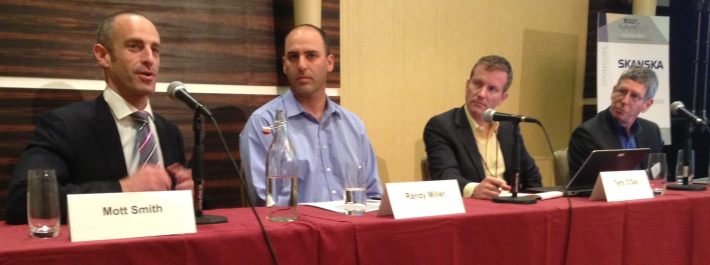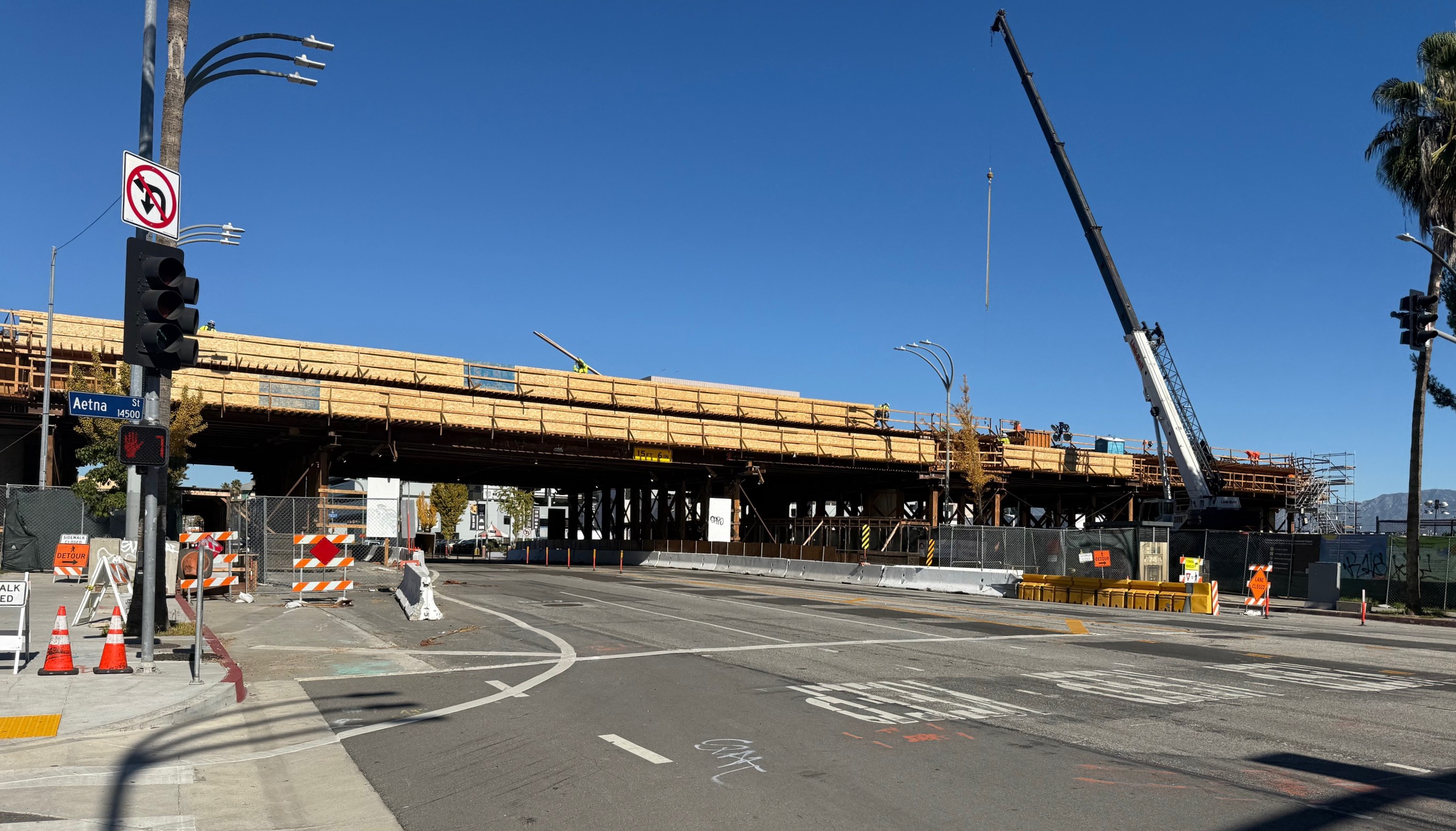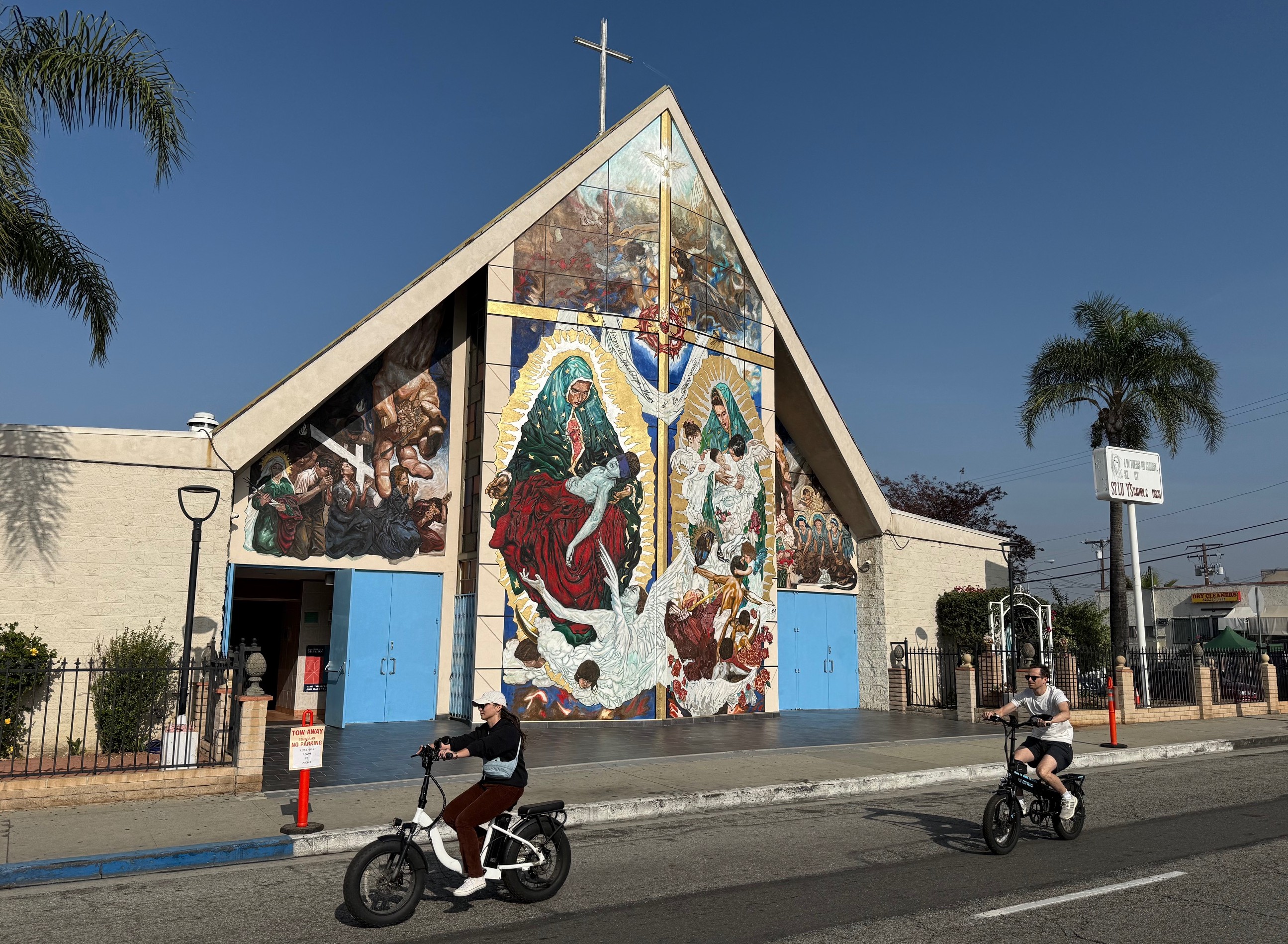Streetsblog L.A. was a media sponsor of yesterday's Future Build Los Angeles 2015 conference which showcased "trends, people and forces remaking the built environment." The event was hosted by the Urban Land Institute (ULI) L.A. in partnership with VerdeXchange.
Many individual speakers and panelists touched on topics pertinent to Streetsblog. City of Los Angeles Deputy Mayor Rick Cole (currently tied for second in SBLA's reader poll to pick Art Leahy's successor - voting ends January 31) touched on the city of Los Angeles' efforts to become a more "livable, walkable" place, and touted Metro's ambitious five new rail projects under construction. Long Beach Mayor Robert Garcia touched on complete streets' ability to accomplish multiple city goals.
Most streetsbloggy, though were panel discussions on transportation and parking.

The Transformation of Ground Transportation and Streets: Trends Driving Tomorrow's Cities
This panel featured:
- Gail Goldberg - head of ULI L.A., and former head of L.A. Department of City Planning (DCP)
- Gabe Klein - entrepreneurial livability rock star, ULI fellow, currently with Bridj
- Seleta Reynolds - General Manager, L.A. City Transportation Department (LADOT)
- Carter Rubin, moderator - L.A. mayoral Great Streets program manager and former Streetsblog L.A. intern
Seleta Reynolds prescribed three important tasks to move cities toward more streets as great public spaces:
- Get a "new cookbook." U.S., CA, and L.A. all currently design streets based on what Reynolds called "insane" standards from American Association of State Highway and Transportation Officials (AASHTO.) Reynolds urged cities not to use a cookie-cutter approach, and to put more credence in forward-thinking design guidance, including National Association of City Transportation Officials (NACTO.)
- Measure the outcomes that count. Reynolds decried the past decades when pretty much the only metric that mattered was car capacity. She's happy that car-centric Level of Service (LOS) is on its way out, but urged that we need to count all people using our streets, and to measure outcomes related to economics, health, and the environment. Reynolds told the story of how L.A.'s CicLAvia events were studied and showed to not only dramatically improve air quality on the CicLAvia route streets, but also overall, including nearby streets not on the route.
- Become better storytellers. Reynolds spoke about how the public quickly gets lost in the jargon of transportation discussions, mentioning that even seemingly simple concepts like a "left-turn pocket" will often be misunderstood. She stated that lots of transportation professionals have "totally lost the plot" and need to develop skills in communicating with the general public
Gabe Klein focused on how smart technologies are disrupting transportation's "legacy assets." Klein told how Uber has exploited the inefficiencies of old-school taxi systems, but that ultimately "the disruptors will quickly be disrupted" with proprietary "sharing" ultimately giving way to peer-to-peer sharing. Klein envisions a future where driverless cars in shared fleets could be active 95 percent of the time, instead of parked 95 percent of the time like current private cars. Klein stressed that Google's driverless car is a "25 mph urban vehicle" expected to be deployed primarily in shared-use fleets, not individually-owned. Klein speculates that it could result in 85 percent fewer cars on our streets, and could dramatically decrease the need for parking.
During question and answer, both Klein and Reynolds expressed caution in giving too much private sector control of public space. Instead, they stressed that the public needs to incentivize outcomes that improve the quality of life for inhabitants. Partnerships should serve public good, with bike share systems as a worthwhile example of a successful public-private partnership.
Goldberg professed that she loves L.A.'s residential streets, but finds commercial corridors "embarassing." She announced an exciting new national ULI initiative that will re-think a key street in L.A., though the formal announcement will be coming soon.
Rubin asked panelists to close with their visions for the future of streets. Klein sees future streets where kids will walk to school and will "again be free to roam." Goldberg echoed Klein's vision, and added a greater role for businesses to be involved in improving the public realm. Reynolds, too, emphasized safety and sees a future where transportation is not so time-consuming so people will have more time to spend with family.

Robo Parking
This panel featured:
- John Given, moderator - principal at CityBuild Advisors
- Randy Miller - president of Nautilus Group
- Terry O'Day - environmental leader, Santa Monica City Councilmember, currently with NRS EV Services
- Mott Smith - principal of Civic Enterprise
This panel wasn't quite so robotic as the title would suggest. Only one panelist, Miller, touched on an actual automated parking garage project, which his firm developed in Santa Monica... but then later tore out ("converted to semi-automated") due to reliability issues.
John Given set the stage, asserting that a shortage of parking could be a good sign: "any place worth its salt has a parking problem." O'Day reviewed the city of Santa Monica's parking management innovations, from smart meters to real-time availability signage.
Developer Mott Smith, though, sounded quite Shoupista in his parking solutions. Smith asserts that developers problems with parking are not based in actual parking demand but "paper demand" - ie: outdated suburban parking minimums required by city codes. Smith stated, quoting a NelsonNygaard Sacramento parking study, that too often shortsighted solutions arise from asking "how much more off-street parking are we going to build to solve our on-street parking problem." Smith criticized L.A.'s one-size-fits-all code for requiring at least two parking spaces for every apartment, when 50 percent of L.A. renter households have one car, and 20 percent have no car.
Smith encourages inexpensive solutions. He does not assume that building more parking is the answer, when a project can often better activate existing parking. Smith highlighted one innovative solution that he finds encouraging: district-based parking credits, currently used in parts of Pasadena and West Hollywood. Look for future coverage on this coming soon at SBLA.






